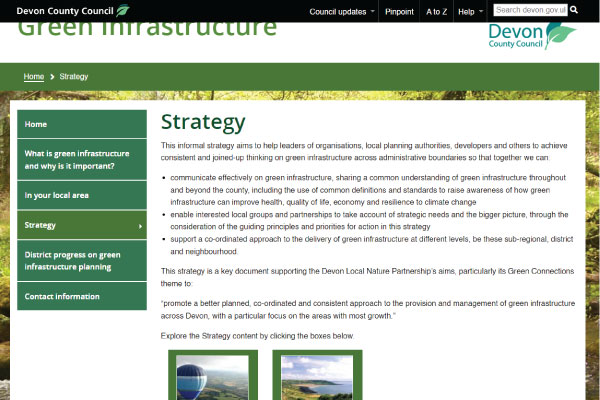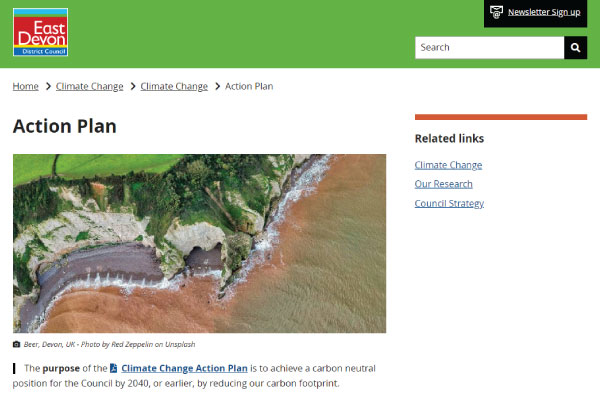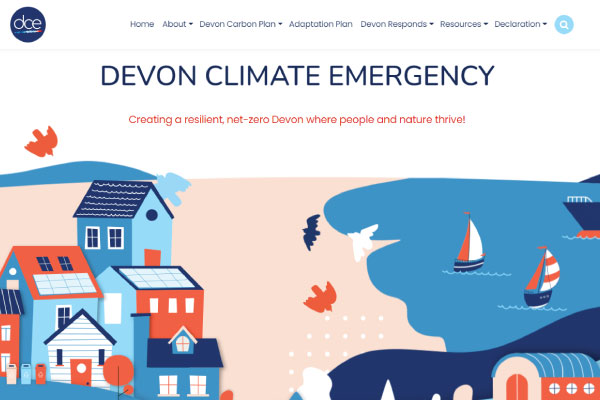COP26 has seen a global focus on addressing the Climate Change Emergency. The Ford Oaks Solar and Green Infrastructure facility provides East Devon with the opportunity to be part of the solution
Commitments to Climate Change
National Commitment
The latest Intergovernmental Panel on Climate Change (IPCC) Report (2022) has shown that if we fail to limit global warming to 1.5 degrees above pre-industrial levels, the flooding and fires we have seen around the world will become more frequent and more fierce, crops will be more likely to fail, and sea levels will rise driving mass migration as millions are forced out of their homes.
The Energy Security Strategy 2022 states that the UK Government expects to see solar installations have ”a five-fold increase in deployment by 2035” and that the Government “will consult on amending planning rules to strengthen policy in favour of development of ground-mounted solar on non-protected land, while ensuring communities continue to have a say and environmental protections remain in place”.
The Strategy also announces an interim 2030 ambition of a four-fold raising of UK installed solar power from 14GW to 70GW.
The March 2020 National Infrastructure Commission set out the amount of renewable energy that would need to be deployed to meet the 2050 net-zero target, including 56-121 GW of solar energy. This target is over nine times the current installed solar capacity of the UK, which in September 2021 was c.13.6GW.
The UK Government has published the ‘Net Zero Strategy: Build back Greener Report (October 2021). The Strategy sets out a ten-point plan to achieve a decarbonised economy in 2050. The report states that: “The net zero economy will be underpinned by cheap clean electricity made in Britain. A clean, reliable power system is the foundation of a productive net zero economy as we electrify other sectors – so we will fully decarbonise our power system by 2035, subject to security of supply”.
The UK Government declared a climate emergency in May 2019. Since then, around 230 local Government Councils have followed suit in also declaring a climate emergency.
Local Commitment
Echoing the national commitments, the East Devon District Council (EDDC) declared a ‘climate emergency’ on 10th July 2019 and published a Climate Change Strategy 2020-2025 which seeks to reduce the Council’s carbon emissions annually, and to be carbon neutral by 2040.
There are nine key themes in this plan where the Council believe they can make meaningful climate change interventions which include energy supply and consumption.
A range of public, private and voluntary organisations from across Devon came together on 22nd May 2019 to form the Devon Climate Emergency Response Group, to declare a climate and ecological emergency and to endorse the principles of the Devon Climate Declaration.
The Devon Climate Emergency project is raising awareness and encouraging everyone to act. A range of organisations across Devon have declared a climate and ecological emergency and have endorsed the principles of the Devon Climate Declaration. Together, they are developing a Devon Carbon Plan, which is being created by the Net-Zero Task Force.
Additionally, it recognises that we need to understand the current and future risks of climate change for Devon and communities that will have to adapt to a warmer world. This work is being taken forward by the Climate Impacts Group.
Devon’s Green Infrastructure Strategy is promoting a joined-up approach to planning and delivery of green infrastructure across local authority boundaries as part of sustainable development delivery. The Devon Local Nature Partnership (LNP), a voluntary strategic collaboration of a huge range of organisations, is working together to tackle Devon’s Ecological Emergency aiming to among other things achieve a step change in water quality and reduce flood risk across all river catchments by targeted wildlife habitat enhancements in key zones.
Devon Green Infrastructure Strategy : https://www.devon.gov.uk/greeninfrastructure/strategy/
EDDC Climate Change Strategy : https://eastdevon.gov.uk/climate-change/climate-change/action-plan/
Devon Climate Emergency : https://www.devonclimateemergency.org.uk/
DNLP : https://www.devonlnp.org.uk/
How does the Ford Oaks Scheme Help?
It is widely recognised that to achieve local, national and global targets, significant investment is required into the rapid deployment of proven renewable and low carbon energy technologies (such as solar power and energy storage) to decarbonise the energy sector.
The proposed development will offer
- The equivalent electricity demand for up to c.18,500 homes per year across the EX5 2 postcode area.
- A significant uplift in the wildlife and biodiversity of the area.
- Protection and addition of trees and hedgerows.
- The provision of wet woodland to increase the biodiversity value of the existing wildlife sites.
- The provision of natural surface water management to improve drainage in the area and protect against flooding both now and as a result of climate change in the future.




